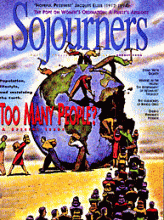As an African living in the United States, I have often been called upon to explain the so-called paradox of societies not having enough food yet increasing their population at an alarming rate.
The questions seem so simple and demand simple solutions. Why the slash-and-burn farming tactics when the forests they destroy are so vital? Why kill animals on the verge of extinction? The answers to these questions would be as simple as the answer that would explain to a homeless person why another person needs a ranch in Wyoming or a condo in Palm Beach when he or she already lives in a penthouse in New York.
The indigenous people who are on the front lines of this struggle between the environment and scarce resources have never had to look at the global picture. Yet they are being called upon to understand and sacrifice for causes that are so abstract and distant.
Having lived most of my life in a tiny developing nation, I have seen firsthand how my people's relationship with land and the environment has changed. We lived just below the desert but in a vegetation zone that has always been capable of sustaining abundant life.
My people for thousands of years have lived on the savannah plains nestled between the rivers Senegal, Gambia, and Cassamance. These rivers all flow west from the Futa Jallon Highlands in Guinea into the Atlantic Ocean. They have never been dry, and the land around them has always been lush and green. Even during the dry season, when no rains came, people still thrived. They never felt that their resources were being depleted or that the land could not sustain them. Unfortunately things have changed since the advent of colonialism.
Read the Full Article
